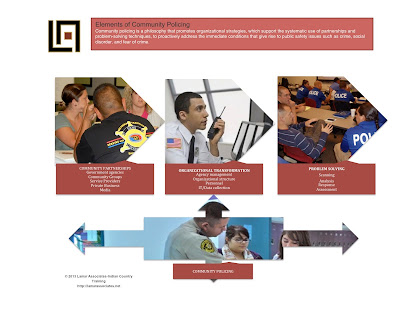We worry about the dangers that youth face on reservations, especially from drugs and gangs. On the Lac Courte Oreilles reservation in Wisconsin, tribal members complained, "There's no jobs. You see 10-year-old kids in little four to five member gangs walking and breaking windows. Something's going to escalate." Likewise, people of the Penobscot Indian Nation complained about youth playing loud music, vandalizing buildings and even stealing during the long Maine nights.
Anyone familiar with Indian Country knows the problems: too few officers patrolling large, rural areas; too many adults doing drugs or drinking instead of being positive role models; not enough resources for existing law enforcement or service providers. It's not hard to understand how tribal police would shy away from tackling new programs or approaches.
However, as tribal police start applying community policing principles, they have been discovering how many problems it solves. In Wisconsin, tribes across the state share resources, personnel and training with state officers to combat gangs and drugs. In the first year of their partnership, inter-agency teams busted up a crack ring on the St. Croix-Chippewa Nation and made over 105 arrests, all while respecting firm boundaries on tribal sovereignty. In Maine, the Penobscot police worked with tribal leaders to open a tribal coffee shop that provides youth with a friendlier and healthier place to hang out. In Idaho, the Nez Perce tribal police collaborated with the Lewiston and Quad Cities police to bust a dealer holding nearly $300,000 worth of drugs, as well as firearms, cash and jewelry. By collaborating—sharing information, resources and activities to achieve a common goal— the sum of the parts ends up having a huge impact on making communities safer.
The elements of community policing are simple (below), and can be applied to a host of problems for Native youth, from gangs to drug endangered children. To learn more, join us for a free online webinar to discuss Creating Collaboration Through Community Policing, hosted by our expert on successful community policing, Dr. Ron Glensor.

This project is supported by Grant Number 2012HEWXK003 awarded by the Office of Community Oriented Policing Services, U.S. Department of Justice. The opinions contained herein are those of the author(s) and do not necessarily represent the official position or policies of the U.S. Department of Justice. References to specific companies, products, or services should not be considered an endorsement by the author(s) or the DOJ but rather illustrations to supplement discussion of the issues.
Showing posts with label Lac Courte Oreilles. Show all posts
Showing posts with label Lac Courte Oreilles. Show all posts
Sunday, August 18, 2013
Community Policing A Success for Tribal Youth
Subscribe to:
Posts (Atom)

